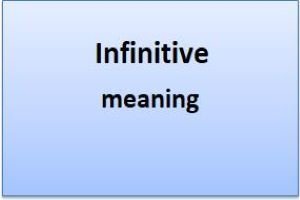Infinitive verb examples sentences:
An infinitive verb is defined as the basic form of a verb plus the word “to.” When using an infinitive verb in the sentence, the word “to” is a component of the verb. In this scenario, it is not serving as a preposition.
- to be (I want to be a chef.)
- to dream (Harry dares to dream about her.)
- to have (We’re going to have a new house.)
- to hold (would you like to hold the baby?)
- to look (she is afraid to look back.)
- to write. (He is planning to write a horror book.)
- to want (It’s good to want your family happy.)
Infinitives contain verbs, but they are not verbs. Adjectives, names, and adverbs can all be used with infinitive verbs. They can serve as different sections, but not verbs, of a sentence, depending on the words they follow.
Infinitive Verbs as Nouns:
Infinitive phrases are formed when infinitive verbs are followed by extra words.
When infinitive verbs follow specific verbs, they might be used as nouns.
In the following sentences, the verbs are underlined and the infinitives are bolded.
- We decided to move on
- They want to dance on the floor.
- She loves to buy books.
- She reminded me to go to the ceremony.
- She does not like to eat food from a canteen.
Infinitive Verbs as Adjectives:
Nouns in a sentence can also be modified by infinitives. Infinitive verbs that function as adjectives define the noun they follow.
Adjectival infinitives are unlike infinitives that serve as nouns in the sentence. Adjectival infinitives answer the inquiry. Consider the first example below for a better understanding.
- Do you have any dishes to wash?
- In the above example, “to wash” clarifies why you are looking for laundry.
- She is a difficult girl to understand.
- My favorite meal to make is pizza and pasta.
- She gave me some opinions to think about.
- I have the most important news to know.
- The best way to practice is the hands-on method.
- Spanish is my least favorite language to learn.
Infinitive Verbs as Adverbs:
Infinitives act as adverbs when they follow an adjective. Consider the following scenario:
You climbed the mountain to see the beautiful lake.
Here, “climbed” is a verb that is modified by the infinitive verb “to see.”. To see is to explain the purpose of climbing.
Read the book to understand more about this character.
She came to see me.
Your sister will be excited to meet me.
She went to the gym to meet the instructor.
You finally agreed to go.
Infinitive Phrase Definition:
We can only know what an infinitive phrase is by first recognizing the meaning of the term infinitive. An infinitive is formed from a verb but has a purpose as a noun, adverb, or adjective. It combines two words, “to” and “a verb.”. The two words function as nouns, adverbs, or adjectives. Let’s look at the infinitive examples as nouns, adverbs, and adjectives.
- I love chicken. (noun)
- I won’t mind waiting. (adverb)
- The boy to returns the notebook is Josphat. (adjective)
What Is an Infinitive Phrase?
An infinitive phrase is multiple words that start with the infinitive. An infinitive phrase is the same as an infinitive and can function as a noun, adverb, or adjective in a sentence. When it is functioning as a noun, infinitive and infinitive phrases can appear as subjects, objects (in this case, direct), or predicate nominatives.
Here are examples of infinitive phrases:
- To clean kitchen utensils.
- To go on holiday.
- I told the candidates to revise thoroughly.
- I want to walk home quickly.

